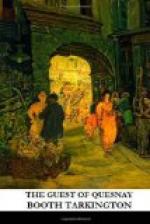It hurtled like a comet down the curve and we were instantly choking in its swirling tail of dust.
“Seventy miles an hour!” gasped George, swabbing at his eyes. “Those are the fellows that get into the pa—Oh, Lord! There they go!”
Swinging out to pass us and then sweeping in upon the reverse curve to clear the narrow arch of the culvert were too much for the white car; and through the dust we saw it rock dangerously. In the middle of the road, ten feet from the culvert, the old woman struggled frantically to get her cart out of the way. The howl of the siren frightened her perhaps, for she lost her head and went to the wrong side. Then the shriek of the machine drowned the human scream as the automobile struck.
The shock of contact was muffled. But the mass of machinery hoisted itself in the air as if it had a life of its own and had been stung into sudden madness. It was horrible to see, and so grotesque that a long-forgotten memory of my boyhood leaped instantaneously into my mind, a recollection of the evolutions performed by a Newfoundland dog that rooted under a board walk and found a hive of wild bees.
The great machine left the road for the fields on the right, reared, fell, leaped against the stone side of the culvert, apparently trying to climb it, stood straight on end, whirled backward in a half-somersault, crashed over on its side, flashed with flame and explosion, and lay hidden under a cloud of dust and smoke.
Ward’s driver slammed down his accelerator, sent us spinning round the curve, and the next moment, throwing on his brakes, halted sharply at the culvert.
The fabric of the road was so torn and distorted one might have thought a steam dredge had begun work there, but the fragments of wreckage were oddly isolated and inconspicuous. The peasant’s cart, tossed into a clump of weeds, rested on its side, the spokes of a rimless wheel slowly revolving on the hub uppermost. Some tools were strewn in a semi-circular trail in the dust; a pair of smashed goggles crunched beneath my foot as I sprang out of Ward’s car, and a big brass lamp had fallen in the middle of the road, crumpled like waste paper. Beside it lay a gold rouge box.
The old woman had somehow saved herself—or perhaps her saint had helped her—for she was sitting in the grass by the roadside, wailing hysterically and quite unhurt. The body of a man lay in a heap beneath the stone archway, and from his clothes I guessed that he had been the driver of the white car. I say “had been” because there were reasons for needing no second glance to comprehend that the man was dead. Nevertheless, I knelt beside him and placed my hand upon his breast to see if his heart still beat. Afterward I concluded that I did this because I had seen it done upon the stage, or had read of it in stories; and even at the time I realised that it was a silly thing for me to be doing.




